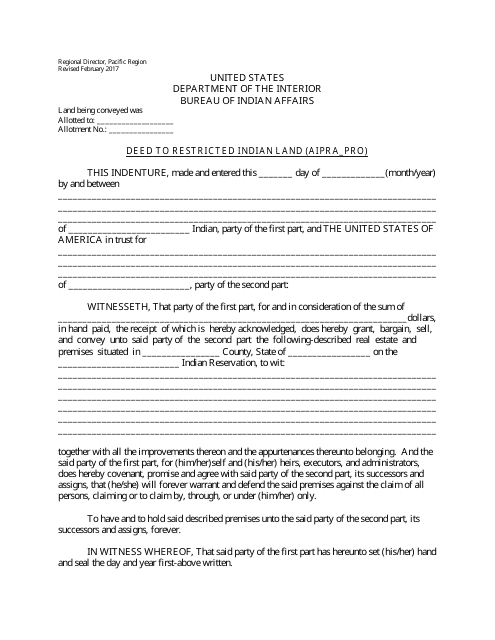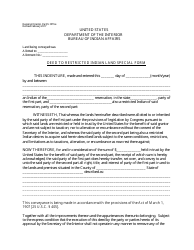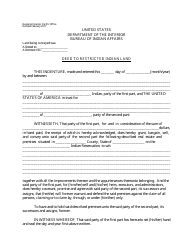Deed to Restricted Indian Land (Aipra Pro)
Deed to Restricted Indian Land (Aipra Pro) is a 2-page legal document that was released by the U.S. Department of the Interior - Bureau of Indian Affairs on February 1, 2017 and used nation-wide.
FAQ
Q: What is a Deed to Restricted Indian Land?
A: A Deed to Restricted Indian Land is a legal document that transfers ownership of land classified as restricted Indian land.
Q: What does AIPRA PRO stand for?
A: AIPRA PRO stands for American Indian Probate Reform Act and the Federal Regulatory Order.
Q: What is the purpose of a Deed to Restricted Indian Land?
A: The purpose of a Deed to Restricted Indian Land is to transfer ownership of land in compliance with the regulations of the American Indian Probate Reform Act and the Federal Regulatory Order.
Q: Who can transfer ownership of Restricted Indian Land?
A: Only individuals who have been granted ownership rights through a valid legal process can transfer ownership of Restricted Indian Land.
Q: How can one obtain a Deed to Restricted Indian Land?
A: To obtain a Deed to Restricted Indian Land, one must follow the legal process outlined in the American Indian Probate Reform Act and the Federal Regulatory Order. This typically involves going through probate court and following the necessary procedures.
Q: What are the restrictions on Restricted Indian Land?
A: Restricted Indian Land is subject to certain restrictions on its ownership and use. These restrictions aim to protect the rights and interests of Native American tribes and individuals.
Q: Can non-Native Americans own Restricted Indian Land?
A: Generally, non-Native Americans cannot own Restricted Indian Land. Ownership is restricted to Native Americans, specifically those who are members of federally recognized tribes or have been granted ownership rights through a legal process.
Q: Are there any exceptions to the ownership restrictions on Restricted Indian Land?
A: There may be some exceptions to the ownership restrictions on Restricted Indian Land, such as leasehold interests or easements granted to non-Native Americans for specific purposes.
Q: What happens if someone violates the restrictions on Restricted Indian Land?
A: Violations of the restrictions on Restricted Indian Land can result in legal consequences, including fines or other penalties. Additionally, the land may be subject to forfeiture or other corrective actions.
Q: Is it possible to obtain a mortgage on Restricted Indian Land?
A: Yes, it is possible to obtain a mortgage on Restricted Indian Land. However, there may be additional requirements and restrictions compared to mortgages on non-restricted land.
Form Details:
- The latest edition currently provided by the U.S. Department of the Interior - Bureau of Indian Affairs;
- Ready to use and print;
- Easy to customize;
- Compatible with most PDF-viewing applications;
- Fill out the form in our online filing application.
Download a printable version of the form by clicking the link below or browse more legal forms and templates provided by the issuing department.






